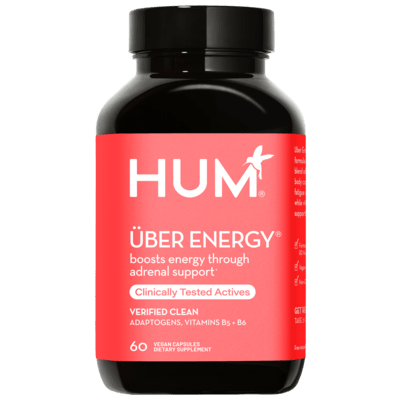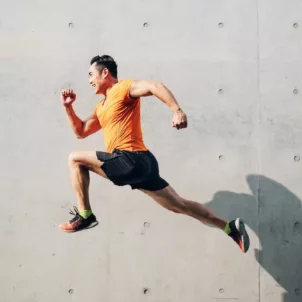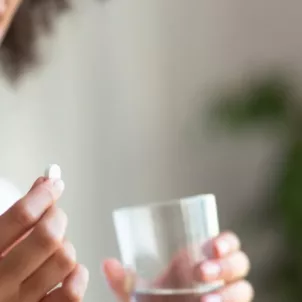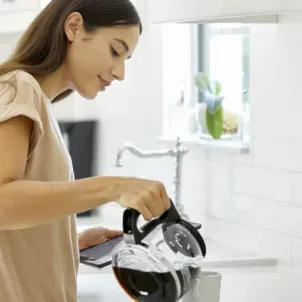Medically Reviewed By
Gaby Vaca-Flores, RDN, CLE
Registered Dietitian Nutritionist
Shavonne Morrison, MS, RD, LD, dives into why energy drinks are bad for you, detailing their potential side effects.
Make your way down any drink aisle at the grocery or convenience store and you’ll spot them: brightly colored, practically luminescent bottles and cans of energy drinks. Plus, new brands claiming to be “cleaner” and “healthier” pop up every day, it seems.
These drinks are meant to increase your energy and focus quickly. But, as the old saying goes: If something sounds too good to be true, it probably is.
For years, healthcare professionals have warned about the dangers and side effects of energy drinks. And it’s not just the caffeine—the habits formed by consuming these beverages make an impact, too.
In this article, we’ll explore just how bad energy drinks are for you and why. Later, we’ll review some healthier alternatives for when you need energy quickly.




Energy Drinks vs. Energy Shots
An energy drink is a beverage that’s intended to increase mental alertness, clarity, and focus. Energy shots are similar in effect, but are typically more concentrated and are considered dietary supplements. They usually contain a variety of ingredients, including but not limited to:- B vitamins
- caffeine
- sugar
Why are energy drinks bad for you?
Concerns about the side effects effects of energy drinks aren’t new. For starters, many experts are wary of them because the energy provided by these drinks is often through large amounts of caffeine and/or sugar. Many people know these ingredients are unhealthy in excess. However, energy drinks often market themselves as healthier by drawing consumers’ eyes to the vitamins and few calories they contain.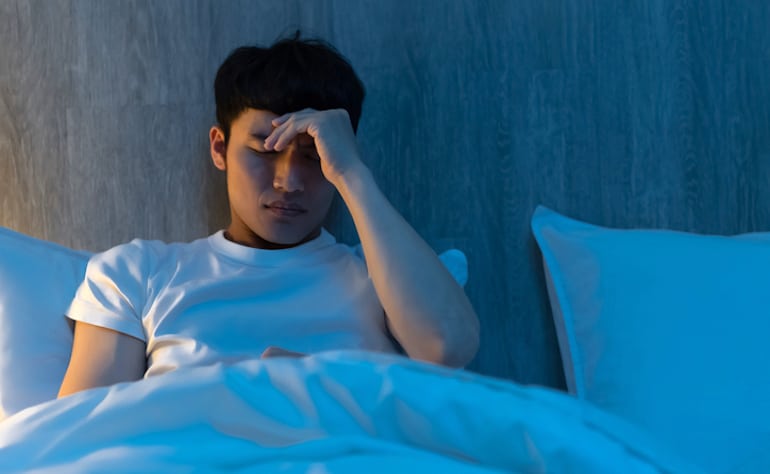
5 Side Effects of Energy Drinks
Let’s dig deeper into some of the potential side effects of energy drinks. They just may have you think twice before grabbing your next canned fix.1. Sleep Disruptions
One of the major issues with energy drinks is their ability to overstimulate your body and/or mind. As a result, they can cause difficulty sleeping and disrupt your circadian rhythm. Ironically, this can perpetuate the problem that led you to rely on the energy drink in the first place! A 2016 study on adolescents shows the trend between energy drink consumption and:- an increase in late bedtimes
- complaints of headaches
- irritation
- fatigue
2. Mental Health + Mood Disturbances
Some research suggests that with chronic use, energy drinks may contribute to low mood. One study states that males in particular demonstrated higher levels of stress after consuming energy drinks. These mental health hazards may be a result of the high levels of caffeine and the tendency to over-consume these drinks. After all, excessive caffeine consumption in one sitting can lead to more severe withdrawal. Additionally, the rapid, short-lived burst of energy must come to an end at some point. For some, coming down from this energy spike can negatively affect your mood. Plus, many people become irritable when they’re tired, and caffeine withdrawal can exacerbate these symptoms.3. Increases in Blood Pressure
Since the main active ingredients in energy drinks are stimulants, regular consumption can lead to more stress on your cardiovascular system. One study states that adolescents who consume energy drinks experience an increase in blood pressure within two hours of consuming these products. Another study cites similar results in young, healthy volunteers. While pumping blood more quickly or forcefully through your veins will give you more energy, it’s not without its drawbacks. Higher blood pressure means more work for your heart, so avoiding energy drinks or drinking them sparingly can help you avoid this additional strain on your body.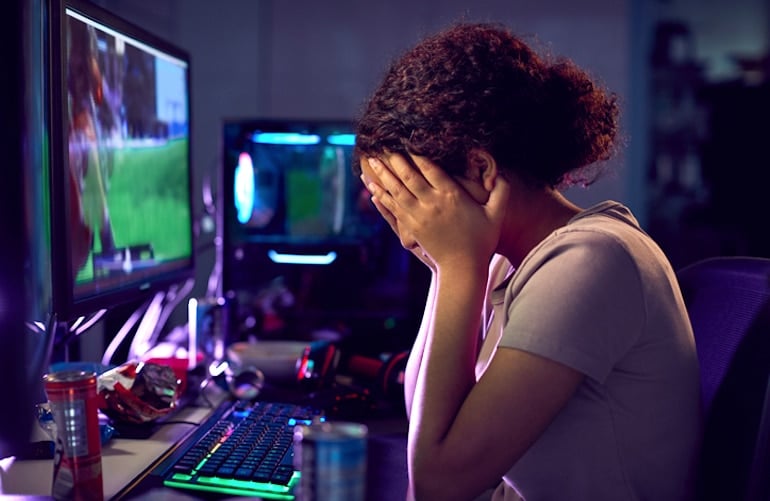
4. Physiological Dependence
A concerning phenomenon is the tendency for those who consume energy drinks to become dependent on them. Some people may start with one or two energy drinks when they’re tired. Eventually, they may come to depend on the caffeine to make it through the day. This may induce a cycle of poor sleep habits that cause an unhealthy reliance on energy drinks. Unfortunately, these beverages only offer relief for a short period before the energy boost wears off. If this pattern continues, more energy drinks may be necessary to produce the desired effect. This could result in negative health outcomes such as:- caffeine toxicity
- liver complications
- excess weight gain (due to excessive sugar intake)
5. Digestive Issues
Many energy drinks now offer sugar-free versions, which is usually accomplished via sugar alcohol or other alternatives. However, some still contain high amounts of added sugars—often as much as sodas. These high levels of sugar or sugar alcohols can disrupt the gut microbiome. (As a refresher, the gut microbiome consists of the “good bacteria” in your stomach and intestines that keep you healthy.) One study also lists stomach irritation among the many negative side effects of energy drinks. While this study doesn’t give specific detail about the type of irritation, it’s safe to conclude that this irritation could cause inflammation and other related issues for the gut. Protecting gut health is key to maintaining a healthy immune system, mood, proper digestion, and hormone function. For that reason, it’s wise to avoid over-consuming energy drinks to preserve optimal gut function.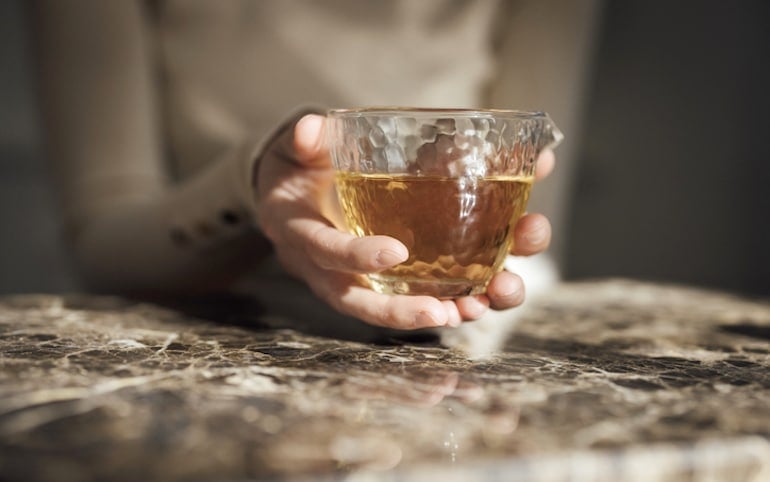
Healthy Alternatives for Energy Drinks
Due to their plethora of drawbacks and the many superior alternatives, you may want to opt out of energy drinks entirely. Here are just a few ideas for healthier alternatives that will help you to stay energized and get through any slumps in your day.Supplements for Energy
One alternative to energy drinks can be found in certain supplements. HUM’s Uber Energy is a caffeine-free alternative that uses B vitamins and brain-boosting nutrients like choline and eleuthero. It also contains adaptogens that combat stress and tension, such as rhodiola rosea and ashwagandha. Rather than causing your body to work harder, these vitamins and herbs work with your body’s natural processes to optimize their functions.green tea
Green tea has about 45 milligrams of caffeine per cup, compared to coffee which has between 90 to 100 milligrams. However, energy drinks contain anywhere from 50 to 500 milligrams per serving! Some people report that green tea gives them more steady energy compared to coffee, as well. This could be due to the L-theanine in green tea, which can promote lasting energy while producing a calming effect. That means you get the extra focus without the caffeine jitters! As a plus, green tea is a source of powerful antioxidants. These protect your body from damage to the skin and other organs caused by UV rays, air pollution, and other types of free radical damage. In sum, green tea stacks up wins across the board.Balanced Snacks
The best energy comes from eating well. If you stop at the convenience store where you’d typically grab an energy drink, next time, opt for a protein bar with at least five grams of protein instead. A balance of carbohydrates and protein will give you a boost and won’t cause a withdrawal like caffeine might. Also, snacks with few (or no) added sugars are ideal, but try to keep them under 10 grams. If you can’t find a protein bar, try:- peanut butter crackers
- cheese + an apple or mandarin orange
- trail mix (note: kinds without M&Ms or other candies will be more balanced)

Hydrating
Did you know that dehydration can zap energy levels? Drinking lots of water throughout the day will keep you moving regularly, too, since you’ll be making regular trips to the restroom. Water, coconut water, and iced herbal tea are all caffeine-free alternatives to help keep your body hydrated and your mind sharp and focused. In general, adults should aim to drink half their body weight in ounces of water each day.final thoughts
Energy drinks have grown in popularity throughout the past few decades, and their sales don’t seem to be slowing down any time soon. However, despite the seemingly healthy claims they make, science still supports avoiding them if at all possible. Overall, there are many superior alternatives to energy drinks, making it easier to steer clear to protect your health. Staying hydrated and consuming regular meals with healthy, balanced snacks in between will provide the best energy to keep you going.More like this
